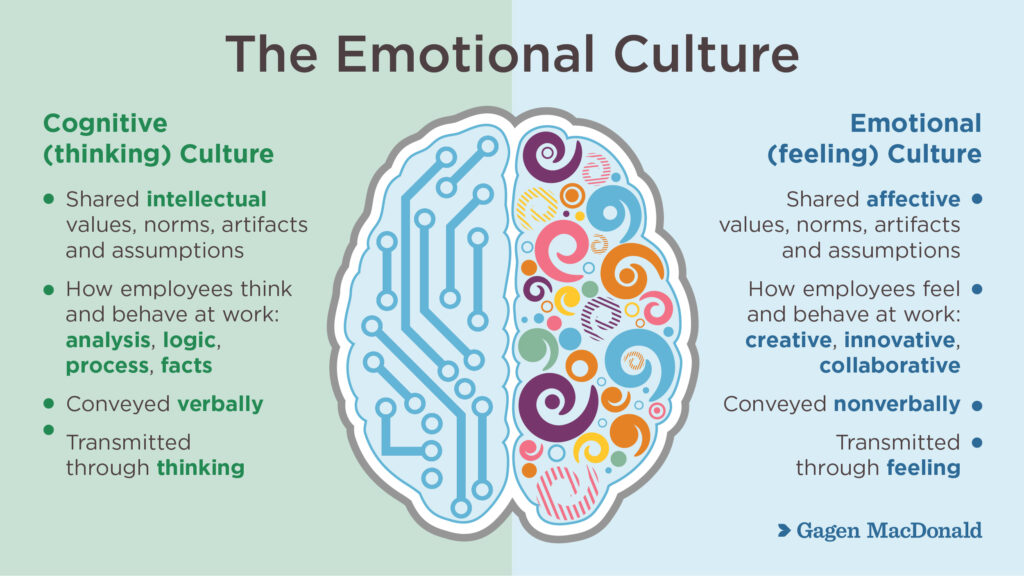“What really matters for success, character, happiness and lifeline achievements is a definite set of emotional skills, not just purely cognitive abilities that are measured by conventional IQ tests”
– Daniel Goleman
Last week, I published a blog post about the importance of emotion in the workplace. As people, we seek meaning and a sense of belonging in everything we do. We want to feel as if we are part of something bigger than ourselves, that our work has meaning, that we are contributing to the group’s performance and that our efforts are valued by others.
When people experience a sense of belonging, they operate with an authentic sense of self. Empowered to be themselves and released from the pressure of conformity, in this state of mind, people bring their highest, best gifts forward. So what can we do to create a sense of belonging and meaning in the workplace? It all starts with an emotional culture.
Meaning and belonging aren’t created in a vacuum. Rather, because we are intrinsically emotional creatures, meaning and belonging emerge when we operate in cultures that promote and accept our emotional truths. When you feel comfortable expressing yourself and your emotions in your environment, you allow yourself the ability to experience your workplace completely. Only when people experience work both emotionally and rationally, as opposed to strictly rationally, can they cultivate a true sense of meaning and belonging. That’s the goal.
As mentioned in last week’s blog, we know that suppressing the emotional elements of our organizational culture limits our passion, creativity, and purpose, thus hindering our potential.

When leaders promote values, send symbols, and emit an energy or other culture shapers to suggest that emotions are not welcome, we go into a shell. We become hesitant to show our emotions. When encouraged to be more emotional, if the surrounding culture is not supportive, we respond negatively. Common objections include:
- “Why do I have to name my emotions? Isn’t it better for me to remain objective and Unemotional?”
- “Why do I have to ask the other person what they feel? Isn’t that stepping over the line and too personal?”
- “What if I ask and their emotions are out of control? What am I supposed to do then?”
- “We make a point of separating emotions from the workplace. After all, we’re here to work, nothing else. They’re not appropriate and only cause problems.” - Ronna Detrick
What does an emotional culture look like for me, the employee?
Emotional cultures where employees feel they can “be myself” are essential for learning and performance. Sadly, that sense of authentic connection exists at too few companies for too few employees today. For instance, fewer than half of employees strongly agree that they feel they belong at their organization, an alarming number feel burned out and lonely and only 3 in 10 employees strongly agree that their top leaders emphasize teamwork & cooperation. – HR Research, 2020.
So what gets in the way of the emotional culture and creating that sense of belonging, meaning and connectedness to the workplace?
The top three barriers are: a heavy workload, lack of appreciation or recognition for contributions and inadequate leadership or management. – HR Research, 2020.
These barriers persist when we don’t feel comfortable expressing our frustrations, fears, anxieties or other struggles with change. Creating a work environment that encourages healthy expressions of emotion can significantly reduce the tension we experience, enhance our sense of belonging and meaning, and ultimately boost our commitment and engagement on a huge scale.
When we ignore our emotions and the emotions of others in the workplace, we contribute to the ongoing suppression of an emotional culture. We, as employees, play a role in cultivating the environment we want to experience and find most productive. As you think of ways you can lead with your emotions and encourage others in the workplace to do so, remember the risk you face if your “true self” is hidden.
- Emotions catalyze positive change; when we ignore them we miss out on the positive changes
- Not allowing or honoring emotions risks losing our humanity and our ability to fully connect with those around us
- Resisting and denying part of who we are demands the same of others. Therefore, only part of everyone shows up for any conversation
- Improving or resolving tension becomes more difficult when trying to exist in a “culture of nice”
- Seeing a change in behavior (self and others) requires a connection with both positive and negative emotions related to any change or undertaking
- Ignoring or suppressing how you feel is harmful - Ronna Detrick
“Every emotion you have — when named, acknowledged, and allowed — holds vast wisdom. They are the key to your behavior, your actions, your results, and everything that happens from this point forward.”
– Ronna Derrick
